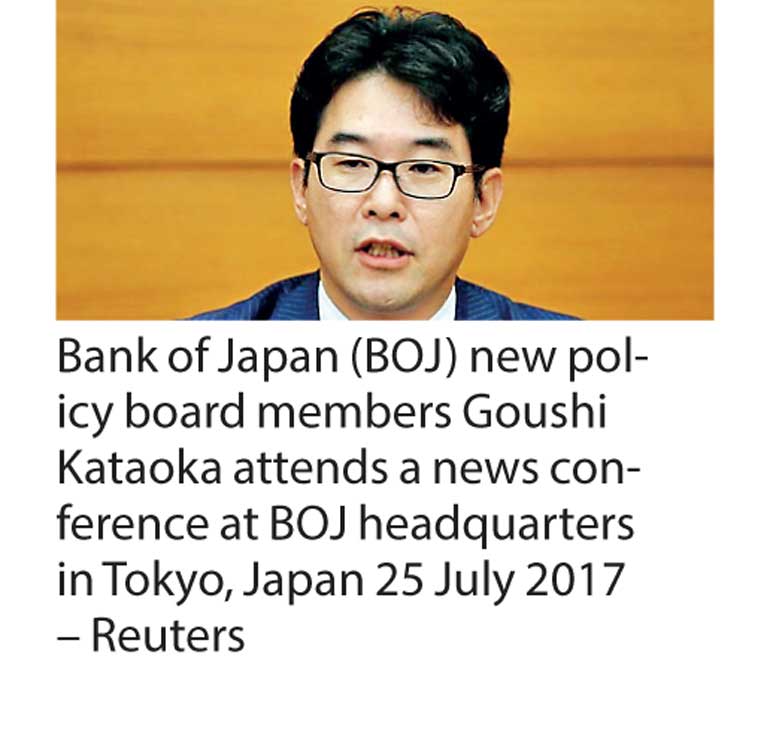Thursday Feb 19, 2026
Thursday Feb 19, 2026
Friday, 2 March 2018 00:00 - - {{hitsCtrl.values.hits}}
 Okayama, Japan (Reuters): Bank of Japan board member Goushi Kataoka on Thursday cautioned against a premature exit from the BOJ’s ultra-loose monetary policy and called for a ramping up of the bank’s massive stimulus program.
Okayama, Japan (Reuters): Bank of Japan board member Goushi Kataoka on Thursday cautioned against a premature exit from the BOJ’s ultra-loose monetary policy and called for a ramping up of the bank’s massive stimulus program.
He also said policy coordination between the BOJ and the government was critical in eradicating public perceptions that deflation will persist, signalling the need for a mix of bigger monetary and fiscal stimulus measures to reflate growth. “To influence inflation expectations, it is essential that policy coordination between the government and the BOJ ... is firmly ensured through action by both entities,” he said in a speech to business leaders in Okayama, Western Japan.
Since joining the board in July last year, Kataoka has been the sole dissenter to the BOJ’s decision to keep monetary policy steady and has called for the BOJ to ramp up stimulus to achieve its inflation target.
Kataoka repeated his calls for the BOJ to ramp up monetary support by seeking to further push down borrowing costs of 10 years and longer, arguing that such a step would boost capital expenditure and help finance government spending.
“By showing the BOJ’s strong commitment to achieving the price target, we can heighten inflation expectations,” he said.
With inflation distant from its 2% target, it was premature for the BOJ to consider following in the footsteps of its U.S. and European peers in dialing back stimulus, he said.
“I believe that, in Japan, there is still a long way to go before considering a change in monetary policy stance,” said Kataoka, a former private economist.
“Improvements in inflation aren’t enough. If the direction of monetary policy is changed without deep consideration to this situation, there’s a risk Japan may return to deflation.”
Kataoka’s comments run counter to many others in the board, who have signalled the BOJ’s next step should be to dial back stimulus given the rising cost of prolonged easing.
BOJ Governor Haruhiko Kuroda told parliament on Thursday that inflation expectations were “heightening somewhat,” signalling hope a strengthening recovery will push up inflation.
But he conceded that wage and price growth remained disappointingly low, reflecting Japan’s sticky deflationary mindset and underscoring market views the BOJ will maintain its stimulus program for the time being.
While Kataoka is unlikely to garner enough votes to affect BOJ decisions, his views underscore the dilemma the bank faces in seeking to achieve its elusive price target with a dwindling policy tool-kit.
His views may carry more weight with the joining of a like-minded academic Masazumi Wakatabe, known as a vocal advocate of aggressive easing, as BOJ deputy governor in March.
After three years of heavy money printing failed to fire up inflation, the BOJ revamped its policy framework in 2016 to one targeting interest rates instead of the pace of asset buying.
Under the current policy, the BOJ guides short-term interest rates at minus 0.1 percent and the 10-year government bond yield around zero percent.
The central bank also has a loose pledge to buy government bonds so its holdings increase at an annual pace of 80 trillion yen ($749 billion). But the pledge has become obsolete with actual purchases slowing to roughly 50 trillion yen per year, which some analysts have described as “stealth easing”.
Kataoka said the bond-buying pledge was “merely a reference” now with the BOJ’s policy targeting interest rates. “But we could face various circumstances, so I don’t see a need to remove the pledge now,” he said.